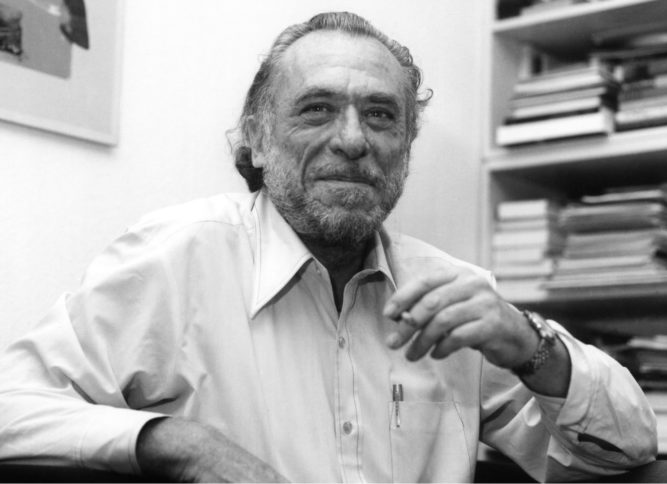
Penultimo appuntamento con “la poesia della settimana” del 2016 dedicato ad uno scrittore e poeta “irregolare”, mitizzato, amatissimo, imitato da tanti, simbolo del genio sregolato e autodistruttivo, Charles Bukowski. La poesia scelta è “Morte di un idiota / Death of an idiot“, tradotta da Vincenzo Mantovani (Mondadori). Vi invitiamo, come al solito, ad ascoltare nel nostro sito la lettura del grande Buk. Prosegue anche in questo periodo festivo l’impegno di Casa della poesia e di Potlatch per una cultura libera, condivisa, diffusa.
Charles Bukowski
morte di un idiota
parlava ai topi e ai passeri
e a 16 anni era bianco di capelli.
suo padre lo picchiava tutti i giorni e sua madre
accendeva candele nella chiesa.
sua nonna venne mentre il ragazzo dormiva
a pregare il demonio che lo lasciasse
libero
mentre sua madre ascoltava e piangeva
sulla bibbia.
sembrava non badare alle ragazze
sembrava non badare ai giochi dei ragazzi
non c’era molto cui sembrasse badare
non sembrava interessato, tutto qui.
aveva una bocca grandissima, brutta, denti
che sporgevano
e gli occhi piccini ed opachi.
le spalle erano spioventi e la schiena curva
come quella di un vecchio.
abitava nel nostro quartiere.
parlavamo di lui, nei momenti di noia, e poi
passavamo a cose più interessanti.
raramente usciva di casa. ci sarebbe piaciuto
torturarlo
ma suo padre
che era un uomo enorme e terribile
lo torturava per noi.
un giorno il ragazzo morì. a 17 anni era ancora
un ragazzo. una morte in un piccolo quartiere si nota
subito, e poi la si dimentica 3 o 4 giorni
dopo
ma la morte di questo ragazzo sembrava non volerci
abbandonare, si continuò a parlarne
con le nostre voci di uomini-ragazzi
alle 6 del pomeriggio, poco prima di buio
poco prima di cena.
e ogni volta che attraverso quel quartiere
oggi, dopo decenni
penso sempre alla sua morte
mentre ho dimenticato tutte le altre morti
e tutto il resto che accadde
allora.
Traduzione di Vincenzo Mantovani

Charles Bukowski
Death of an idiot
he spoke to mice and sparrows
and his hair was white at the age of 16.
his father beat him every day and his mother
lit candles in the church.
his grandmother came while the boy slept
and prayed for the devil to let loose his hold upon
him
while his mother listened and cried over the
bible.
he didn’t seem to notice young girls
he didn’t seem to notice the games boys played
there wasn’t much he seemed to notice
he just didn’t seem interested.
he had a very large, ugly mouth and the teeth
stuck out
and his eyes were small and lusterless.
his shoulders were slumped and his back was bent
like an old man’s.
he lived in our neighborhood.
we talked about him when we got bored and then
went on to more interesting things.
he seldom left his house. we would have liked to
torture him
but his father
who was a huge and terrible man
tortured him for
us.
one day the boy died. at 17 he was still a
boy. a death in a small neighborhood is noted with
alacrity, and then forgotten 3 or 4 days
later.
but the death of this boy seemed to stay with us
all. we kept talking about it
in our boy-men’s voices
at 6 p.m. just before dark
just before dinner.
and whenever I drive through that neighborhood now
decades later
I still think of his death
while having forgotten all the other deaths
and everything else that happened
then.

Leggi di più su Charles Bukowski


Commenti recenti